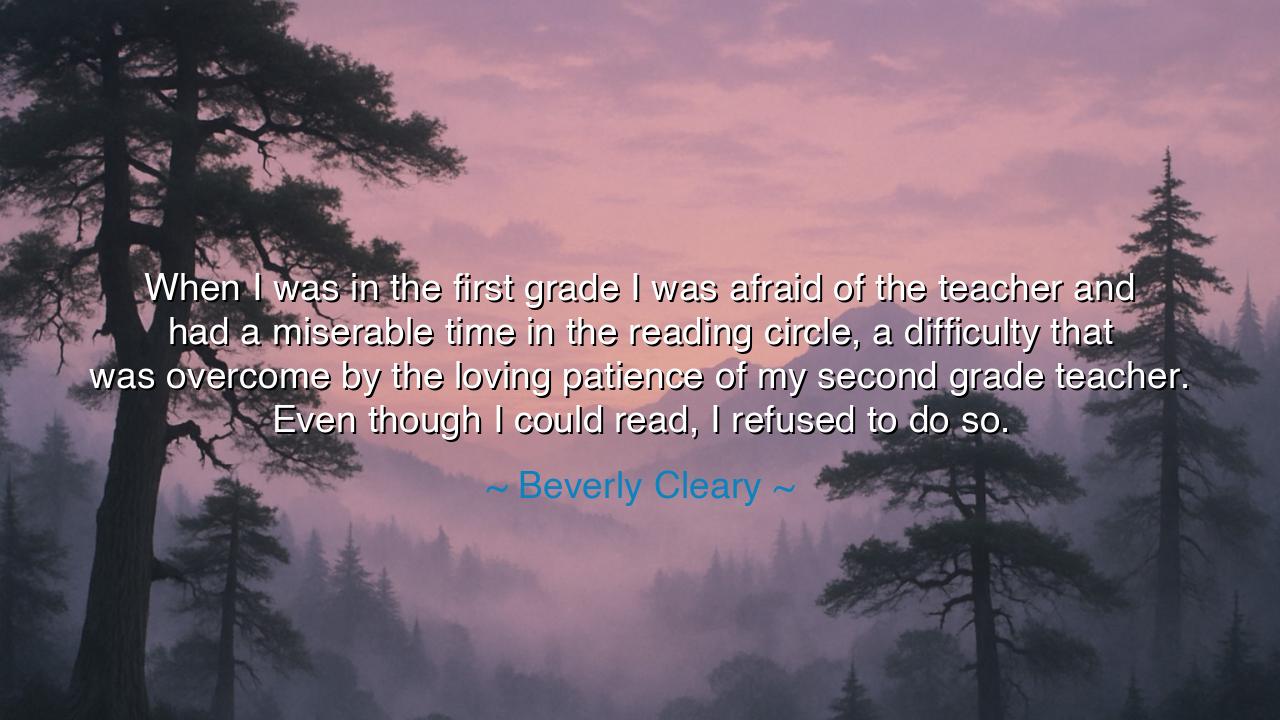
When I was in the first grade I was afraid of the teacher and
When I was in the first grade I was afraid of the teacher and had a miserable time in the reading circle, a difficulty that was overcome by the loving patience of my second grade teacher. Even though I could read, I refused to do so.






Hear the words of Beverly Cleary, beloved teller of children’s tales, who once revealed a glimpse of her own childhood struggle: “When I was in the first grade I was afraid of the teacher and had a miserable time in the reading circle, a difficulty that was overcome by the loving patience of my second grade teacher. Even though I could read, I refused to do so.” In these simple words lies a profound lesson: that fear can silence even the gifts we already possess, and that kindness can awaken them once more.
From the dawn of learning, children have gathered in circles to recite and to read, trembling before the watchful eyes of their elders. For the tender mind is like soft clay—it hardens according to the touch it receives. In Cleary’s story, the sternness of one teacher cast a shadow that choked the joy of reading, turning talent into misery. Yet, the gentle warmth of another, with patience and care, rekindled the flame. Thus do we learn: that authority wielded with fear breeds silence, while authority guided by love nurtures growth.
Consider, O listeners, the tale of young Thomas Edison. As a boy, his schoolmaster called him “addled” and unteachable, crushing his spirit. Yet his mother, refusing to believe in his failure, taught him herself, with unwavering faith. From her patience came the inventor who later lit the world with his discoveries. In Cleary’s account, as in Edison’s, the difference between despair and triumph lay not in the child’s ability, but in the understanding of those who guided them.
So too must we remember that fear can veil our gifts. Beverly Cleary could read, yet her fear forbade her from showing it. How many souls among us carry hidden talents, locked away by wounds of the past, by harsh words, or by shame? And how many of these could blossom if only touched by patience, if only watered with kindness? This is the ancient truth: that the seeds of greatness lie dormant until the hand of compassion awakens them.
The meaning of Cleary’s words is therefore not confined to childhood. They speak to every age and every place where fear has silenced the voice of courage. In the workplace, in the home, in the public square—wherever authority is harsh, potential is lost; wherever compassion is offered, it thrives. To lead others, whether as teacher, parent, or guide, is to hold in your hands not only knowledge, but also the delicate roots of another’s spirit.
The lesson is plain: choose to lead with patience, not with fear. Choose to nurture rather than to intimidate. If you are a teacher, see beyond the silence of your students, and remember that they may fear more than they fail. If you are a parent, temper discipline with understanding. And if you are a leader, recall that the strength of your guidance is not in how loudly others obey, but in how deeply they grow.
Practical actions stand before you: practice listening before you judge. Offer encouragement before correction. Give those around you the space to stumble, knowing that from stumbling comes true learning. And in your own life, seek the mentors and companions whose voices lift rather than crush. For as Cleary’s second teacher proved, even a single act of kindness can redirect the course of a life.
Thus, O children of tomorrow, remember Beverly Cleary’s confession. In it we see both the wound of fear and the healing of love. Let it teach you to be gentle with those who learn, for their silence may hide great gifts. And let it remind you to seek, in your own path, those who will guide you not with cruelty, but with patience. In this way, you too may overcome fear and let your hidden voice be heard.






AAdministratorAdministrator
Welcome, honored guests. Please leave a comment, we will respond soon